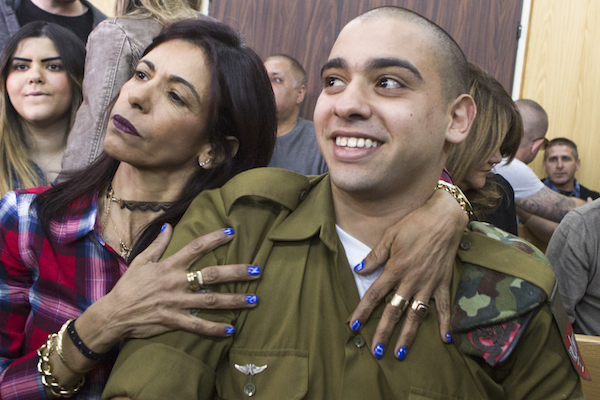An 18-month prison sentence for Elor Azaria, who shot and killed a wounded Palestinian attacker last year, is a reminder that the occupation has no place for law and justice.

There was something about the Elor Azaria trial that felt scripted. I only spent three days in court last year, watching Azaria testify, but while there I spoke with many other journalists who had been there for the entire trial. Oddly, despite the in-depth interrogation of every detail, everyone with whom I spoke felt the same way — that the trial’s outcome felt predetermined. In an article I wrote for Haaretz at the time, I noted:
Despite all the details and despite everything hanging by a thread, every journalist I spoke to similarly estimated the results of the trial in advance, with almost no connection to what was happening in court: Azaria would be found guilty but would receive a relatively minor sentence. There were also rumors among the journalists that the lawyers on both sides were part of this equation. After all, such an outcome would be in the system’s clear interest.
It turned out to be an accurate forecast: the judges struck a harsh tone when finding Azaria guilty last month, yet handed down a minimal 18-month jail sentence Tuesday morning. Azaria may well not end up serving the entirety of that prison term.
As it happens, it wasn’t necessary to attend the trial in order to see what was coming. The incident in Hebron, where Azaria executed a wounded and disarmed Palestinian attacker, was clear from the video footage, as was the fact that the army could not ignore the event once it had been publicly exposed. If it had not prosecuted Azaria, the message to every soldier would have been that they can behave however they see fit and get away with almost anything simply by citing “operational considerations.”
There is also a much more essential element at play here. Israel’s ability to avoid finding itself in the International Criminal Court over the actions of its security forces in the occupied territories largely depends on the military’s mechanisms for conducting internal investigations. If the army doesn’t occasionally discipline its soldiers for violating operational procedures, Israel’s politicians and generals could, eventually, face justice in The Hague.
On the other hand, the IDF has long failed to grasp its duties as an impartial sovereign entity in the occupied territories. The army’s role, aside from the obvious task of preventing terror attacks and protecting settlers, is to win a battle of consciousness — to make clear to Palestinians and Jews alike that Israel is able to maintain the occupation for as long as is required. When we take into account the general atmosphere surrounding Azaria’s trial — the massive public support for the soldier — it is clear why his punishment needed to be as light as possible. It is for this reason that the compromise — a stinging conviction ruling combined with a minimal prison sentence — was struck.
The only problem is that the sentencing has no legal logic. If Azaria did indeed shoot Abdel Fattah al-Sharif in the head in order to avenge the wounding of his friend and to deter future attackers — as the prosecution set out and the court accepted — then he deserved a far heavier punishment. On the other hand if he truly felt imperiled, as the defense claims, then his sentence should have been much lighter.
Azaria’s punishment was decided in the political realm, not by the courts, in a compromise that characterizes the occupation’s conflicting needs at any given moment. Law and justice are not the story of the occupation.
This article was originally published in Hebrew on Local Call. Read it here. Translated by Natasha Roth.


